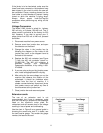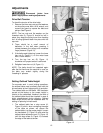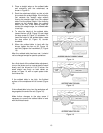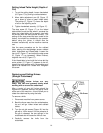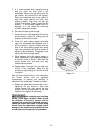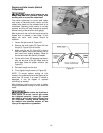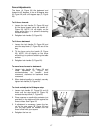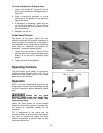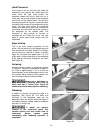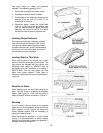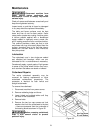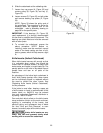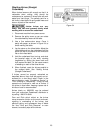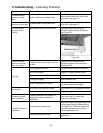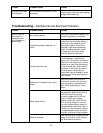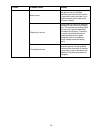
19
Hand Placement
At the start of the cut, the left hand holds the
workpiece firmly against the infeed table and
fence, while the right hand pushes the
workpiece toward the knives. After the cut is
under way, the jointed surface of the workpiece
rests firmly on the outfeed table. The left hand
should press down on this part, at the same time
maintaining flat contact of the workpiece with the
fence. The right hand pushes the workpiece
forward and before the right hand reaches the
cutterhead, the right hand should be moved to
the workpiece on the outfeed table. The
workpiece is then pushed on through to
complete the cut. Follow the 3-inch rule (see
page 5). Never pass hands directly over the
cutterhead.
Edge Jointing
This is the most common operation for the
jointer. Set the fence to the 90-degree stop and
thus square with the table. Depth of cut should
be the minimum required to obtain a straight
edge. Do not make cuts deeper than 1/8” in a
single pass. Hold the best face of the workpiece
firmly against the fence throughout the feed.
See Figure 26.
Surfacing
Jointing the face of stock, or surfacing is shown
in Figure 27. Adjust the infeed table for depth of
cut. Cuts of approximately 1/16” at a time are
recommended, as this allows better control over
the material being surfaced. More passes can
then be made to reach the desired depth.
Always use a hold-down or
push block when surfacing short stock or
stock less than 3 inches thick. Figure 26
shows push blocks being used for surfacing.
Rabbeting
A rabbet is a groove cut along the edge of a
workpiece. See Figure 28. The width and
thickness of the workpiece used will be
dependent upon the desired width and length of
the rabbet. However, never rabbet a workpiece
less than 12 inches long.
A rabbet cut requires
removal of the cutterhead guard. Use
extreme caution and keep hands clear of
cutterhead. Always replace guard
immediately after rabbeting operation is
completed.
Figure 26
Figure 27
Figure 28



